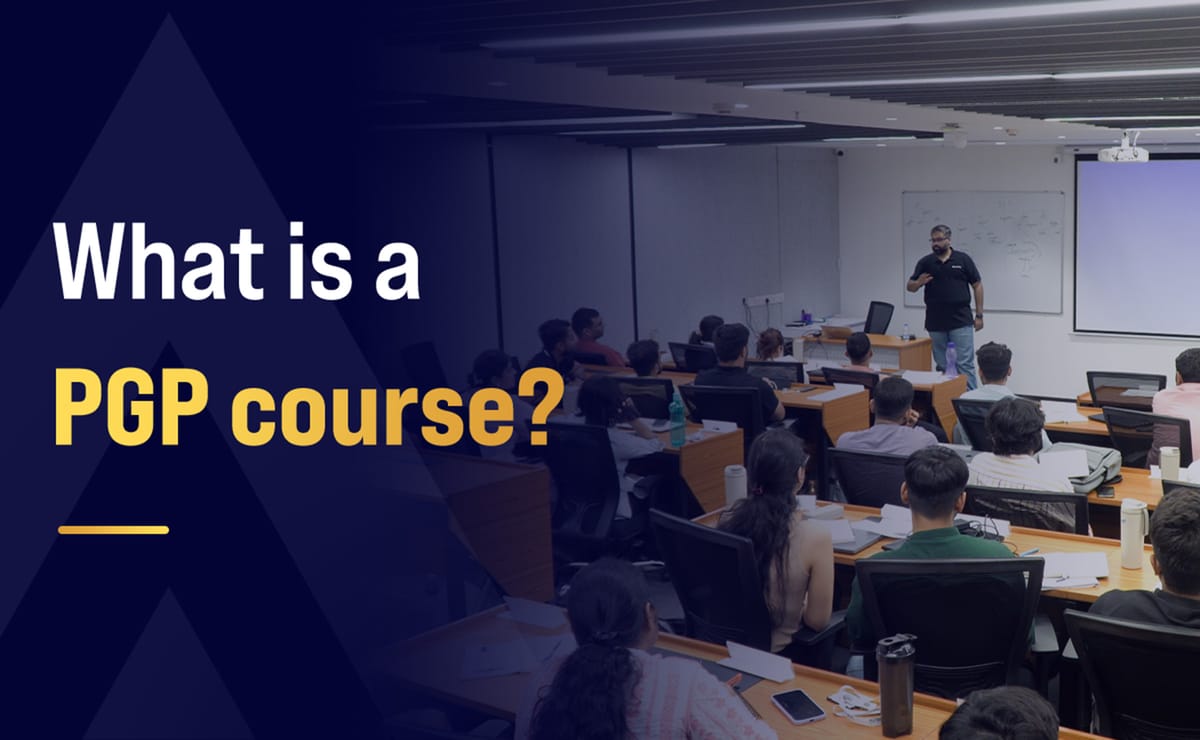What is a PGP Course?

The educational pursuit you choose marks a pivotal moment in your life. It opens potential gateways to satisfying and successful career opportunities. The gravity of this situation increases even more when you are considering an advanced business education in India.
Among the distinct types of management studies, the choice between an MBA (Master of Business Administration), a PGP (Post Graduate Program), and a PDGM (Post Graduate Diploma in Management) is often at the forefront.
For instance, the PGP MBA's full form itself indicates a focus on advanced management principles, yet it offers unique offerings and value propositions tailored to students' specific needs. While these courses offer rigorous pedagogy and develop valuable skills, there are distinct differences among them that a student should know about.
This article, therefore, provides a detailed overview of what a PGP course is in India. The article will further delve into PGDM and MBA programs, highlighting their distinct characteristics and key differences.
What Is a PGP Course?
A PGP is a specialized, post-graduate program in management. While it bears similarities to an MBA, it does not cover all its associated subjects; it only covers the core ones. They are designed as new-age programs that benefit the modern workforce by providing industry-oriented skills. This equips them for better positions and higher-paying jobs in India.
PGPs follow a flexible curriculum that provides a deeper understanding of relevant business disciplines while going beyond foundational knowledge. These programs frequently update their curricula to align with evolving industry trends and standards. This helps develop well-rounded candidates who can contribute to diverse organizational roles.

PGP vs. PGDM vs. MBA: Key Differences
PGP and PGDM courses have more in common than a traditional MBA course. However, there are some differences among them that students should know about.
Accreditation:

MBA: Offered by UGC-recognized universities in India, MBAs follow a regulated curriculum and are globally valued for providing comprehensive business knowledge and leadership training, making them valuable in the corporate world.
PGDM: PGDM courses are offered by autonomous institutions recognized by the All India Council for Technical Education (AICTE). Additionally, certain accreditations, such as from the AIU (Association of Indian Universities), position PGDMs as equivalent to MBAs in India.
PGP: While not affiliated with any specific universities, PGP programs are industry-backed and comparable to an MBA in terms of their academic content and the skills they impart. Such courses are often guided by experienced professionals to ensure relevance.
Curriculum:
MBA: The MBA curriculum is based on UGC requirements, which are broad in the basic subjects of business management but lacks a consistent, up-to-date focus. It is carefully designed to establish a solid theoretical base while also providing skills important for success.
PGDM: PGDM programs enjoy the flexibility to periodically revise their curriculum, enabling them to incorporate the latest industry insights. It combines the core subjects of business management with a practical, industry-aligned curriculum while providing specialization in high-demand fields.
PGP: Focuses on core management subjects and a specialized niche chosen by a student. It provides targeted expertise according to industry standards, but often with less coverage of broad subjects than an MBA or PGDM.
Program Duration:
MBA: MBA courses are primarily a full-time, two-year course. However, there are also one-year MBAs available globally, known as PGP programs in India.
PGDM is a full-time, two-year program similar to an MBA, offering comprehensive management education with core courses and electives.
PGP: Varies by institution and can span between 1 and 2 years. It provides options for internships and intensive specialization, especially in programs like those at IIMs.
Credentials Achieved:
MBA: MBAs are exclusively degree programs recognized as postgraduate qualifications that signify advanced expertise in business and management.
PGDM: PGDM programs offer a diploma upon completion. It is because, in India, degrees can only be awarded by institutions recognized as universities or deemed universities by the UGC.
PGP: It is typically a certificate course. However, various autonomous institutions, such as IIMs, also award diplomas upon completion of their courses.
Cost:

MBA: It depends on government and private universities, where government universities are more affordable. However, private universities provide better infrastructure and amenities, hence incurring higher costs.
PGDM: Generally, higher fees due to autonomy and industry-specific curriculum, often making it costly.
PGP: Tends to be less expensive than an MBA or PGDM. This is due to such courses being shorter, yet costs vary by specialization and institute.
Target Audience:
MBA: An MBA attracts diverse profiles united by goals such as accelerating careers, pivoting into a different industry, breaking into leadership positions, and more.
PGDM: Typically designed for fresh graduates or professionals with limited experience who wish to gain foundational knowledge in business management.
PGP: Primarily designed for professionals with work experience who want to enhance their management skills and advance in leadership roles.
What is a PGP in sales and marketing?
PGP in Sales and Marketing is a specialized postgraduate program that equips students with the skills and knowledge to succeed in the fast-evolving, dynamic world of sales and marketing. Key features include:
- An expansive course that explores key elements of sales and marketing, such as market research, branding, digital marketing, sales management, and customer relations.
- Formal training is delivered through real-life case studies, simulated practice, and projects directly related to current industry needs.
- Visits, workshops, and networking with experienced professionals provide students with ample exposure to the industry and first-hand insights into the business world.
- There is a focus on niche skills development, which can differentiate the graduates in a competitive job environment.
The fact that a PGP program takes less time is one of several advantages, as it allows a person to resume work faster and enjoy professional growth. Shorter programs have lower tuition fees and are hence more affordable, serving a larger population.
If a PGP program in this specialization appeals to your unique requirements, then the Altera Institute of Management (AIM) is the right choice for you.
The Altera Institute offers a one-year specialist PGP course in applied marketing with a strong focus on brand, marketing, and product management. It follows an industry-backed curriculum, trusted by leading organizations such as Mamaearth, Amazon, HUL, Levi's, and many others, who also actively use our programs to upskill their workforce.
The Altera Institute brings a modern spin to the traditional MBA by focusing on skill development through case studies, mentorship from industry professionals, and simulations of real-world problems through projects and internship opportunities with a vast pool of leading organizations serving as hiring partners.
Our record of accomplishment demonstrates our credibility, with over 3,000 alumni across programs, 50+ cohorts, and partnerships with 30+ companies. So, when it comes to a PGP course, do check out the Altera Institute’s PGP, as it is one of the best marketing programs out there and acts as a boost for aspiring marketing professionals and enthusiasts alike.
Advantages and Disadvantages of Pursuing a PGP, PGDM and an MBA Course
PGP
Advantages
- Specialized Program: PGPs are designed to provide targeted upskilling to gain deep expertise in a niche area.
- Relevance to Industry: PGP programs can be developed in conjunction with industry specialists. The program ensures it stays current and aligns with industry trends.
- Duration Flexibility: PGPs are usually flexible, unlike the typical two-year programs. This is for students who want to learn more intensively and at a faster pace.
- Industry mentors are frequently industry faculty members. They expose them to the real world of knowledge and offer appealing networking services.
Disadvantages
- Poor Recognition: PGPs are equated to MBA in India; however, the recognition that MBA programs have at an international level is not conferred to the PGPs.
- Reduced Scope: The PGP courses are specialized, which may limit career options compared to an expanded MBA.
- Rigorous Curriculum: PGPs, particularly the one-year program, have a strict curriculum that requires students to work long hours and dedicate most of their time to the program.
- Less General Management Exposure: PGPs do not necessarily offer an overview of general management principles as MBAs do.
PGDM:
Advantages
- Industry-Relevant Curriculum: Focuses on practical skills required in today’s business environment.
- Flexibility: Institutions can revise their curricula in line with industry trends.
- Different Learning activities: They involve case studies, simulations, and guest lectures to provide practical learning.
- Cost-Effective: In most cases, it is cheaper than MBA programs, particularly in private institutions.
Disadvantages
- Limited Global Recognition: Although they are revered in India, this may not be the case in other countries for MBAs.
- Diploma vs. Degree: PGDMs are diplomas that, in some cases, may be favored by employers over degrees.
MBA:
Advantages
- International Recognition: It is highly esteemed by employers worldwide.
- Good Academic Background: Studies the basic business operations, increasing the level of theoretical knowledge.
- Networking Opportunities: Provides access to colleagues, alumni, and industry leaders.
- Leadership Development: Cultivates strategic thinking and leadership skills.
Disadvantages
- High Price: Tuition may be high, especially at the best institutions.
- Time Commitment: The rigorous curriculum demands substantial time and effort.
- Competitive Admissions: Entry into prestigious MBA programs can be challenging.
Ultimately, the decision between a PGDM, PGP, and an MBA should be guided by your career goals, financial situation, and personal preferences, taking into account the specifics of each program and institution.
Top Colleges Offering PGP Courses
PGP courses are offered by some of the top institutions in the country. Here are the details of the top 5 colleges offering PGP courses in India:
Indian Institute of Management (IIM) Ahmedabad
Ranking: Ranked #1 college in India, according to the NIRF ranking 2024 report.
Duration: Two-year full-time program.
Credentials: Graduates earn a diploma recognized globally.
Objective: Foster change agents and motivational leaders who encourage integrity, honesty, and high performance.
Indian Institute of Management (IIM) Bangalore
Raking: Ranked #2 in the NIRF ranking 2024 report.
Duration: Two-year full-time program
Credential: Graduates earn a diploma recognized globally.
Objective: To nurture and develop personalized care rather than mass-producing business leaders in an application-oriented environment.
Indian Business School (IBS) Mumbai
Ranking: Ranked 20th among Top B-Schools by Business Today and 3rd in the West Zone—Silicon India
Duration: Two-year full-time program
Credential: Graduates earn a diploma recognized globally.
Objective: To develop skilled, ethical leaders with a global business perspective, fostering innovation and excellence.
Indian Institute of Management (IIM), Kozhikode
Ranking: Ranked #3 in the NIRF ranking 2024 report.
Duration: Two-year full-time program
Credential: Graduates earn a diploma recognized globally.
Objective: To honor India's business leaders, spark youth innovation, and inspire budding entrepreneurs to drive India's growth and entrepreneurial spirit.
Indian Institute of Management (IIM), Lucknow
Ranking: Ranked #7 in the NIRF ranking 2024 report.
Duration: Two-year full-time program
Credential: Graduates earn a diploma recognized globally.
Objective: To produce future-ready managers who are sound in their fundamentals, visionary, and able to guide and mold the business of tomorrow.
Admission Requirements For PGP, PGDM, and MBA Courses
Admission requirements for PGP, PGDM, and MBA programs can vary by program and institution. However, here are some general requirements that are commonly applicable:
Eligibility Criteria:
Bachelor's Degree: You must have a bachelor's degree in any field, and you must have a score of at least 50 percent from a recognized university.
Entrance Exam Scores: A valid mark of national-level exams such as CAT, XAT, GMAT, CMAT, MAT, and SNAP.
Work Experience: Programs may include applicants' previous work experience, usually 1-5 years, mostly in executive PGP and MBA courses.
Selection Process:
The admissions into most of these programs take up multiple rounds:
Shortlisting: The shortlisting is based on academic merit, entrance examination results, and work experience, if relevant.
Written Ability Test (WAT): A test designed to assess writing skills and clarity of thought.
Group Discussion (GD): It involves discussing a topic to test teamwork, communication skills, and critical thinking.
Personal Interview (PI): A personal interview to evaluate the motivation, suitability, and fitment of each applicant to the program.
Additional Considerations:
Diversity: Many institutions appreciate applicants with diverse academic or other professional backgrounds, which adds variety to the classroom.
Extracurricular Involvement: Participation in sports, arts, or other activities can strengthen an application.
Statement of Purpose (SOP): An effective SOP will help the applicant catheterize his/her career goals, the rationale behind joining the program, and how these relate to the institution.
Letters of Recommendation (LORs): Strong recommendations from former professors or supervisors can provide insight into the applicant’s skills, character, and potential.
PGP vs PGDM vs MBA: Salary Packages in India
PGP (Post Graduate Program):
- Best Institutions: The salaries of graduates from top institutions, including the IIMs, are high, averaging INR 20+ lakhs/annum, and the highest offers are INR 30 lakhs and above.
- Other Reputed Institutes: Graduates can expect packages of INR 12-18 lakh per annum.
PGDM (Post Graduate Diploma in Management):
- Best Colleges: The graduates of the Postgraduate Diploma in Management and Leadership Programme at reputable colleges generally have high-paying jobs, averaging INR 15-25 lakh per year.
- Other Institutes: Salaries vary, but in most cases, they range from INR 8 to 15 lakhs per year.
MBA (Master of Business Administration):
- Best Institutions: An MBA from top universities and business schools will fetch average packages of over INR 15 lakhs, with the best deals of up to INR 25 lakhs per year.
- Other Rated Institutions: MBA students of other reputable institutions would have an average package of INR 6-12 lakhs per annum.
Important Considerations:
- Specialization: Finance, Marketing, and Data Science are in-demand fields, which are usually better paid.
- Experience: Prior work experience can significantly enhance salary prospects.
- Internships: Industry internships offer valuable experience and often lead to job offers.
These figures are approximate, and salaries can differ based on individual performance and company-specific factors. Regularly reviewing placement records of specific institutions will provide a clearer picture of ever-changing salary trends.
FAQs
Q1. Are PGP and an MBA the same?
Ans: No, PGP (Post Graduate Program) is either a certificate or a diploma program provided by independent institutions and has no relation to a university. An MBA, on the other hand, is a degree offered by a university accredited to award it and with a fixed curriculum in accordance with UGC guidelines.
Q2. Are PGP and PGDM the same?
Ans: Not exactly. PGP and PGD are both offered by independent institutions, although the Post Graduate Diploma in Management (PGDM) is a diploma accredited by AIU and is similar to the MBA in India. PGP can, however, be a smaller, specialized course focused on niche-specific skill training.
Q3. Which one is more recognized globally?
Ans: MBA programs tend to be more popular in the world in terms of their degree and academic status. The value of PGDM & PGP programs is also questionable, and their acceptance can depend on how well the institution is known.
Q4. Which program is more industry-oriented?
Ans: PGD programs are more industry-based because they can revise their curricula after short intervals. This enables them to align with prevailing industry trends and demand.
Summing up
It is a big decision between PGP, MBA, and PGDM. The choice of the right program must align with your career aspirations, industry requirements, and personal objectives. Every program has strengths and weaknesses.
PGP courses, in particular, offer a flexible and targeted approach to acquiring specialized skills. These programs suit working professionals aiming to enhance their skills or transition careers without dedicating two full years to a traditional MBA.
However, it's crucial to carefully consider the institution offering the PGP program, its curriculum, faculty, and placement record. An informed choice here can set you on a fulfilling path toward a prosperous career.





